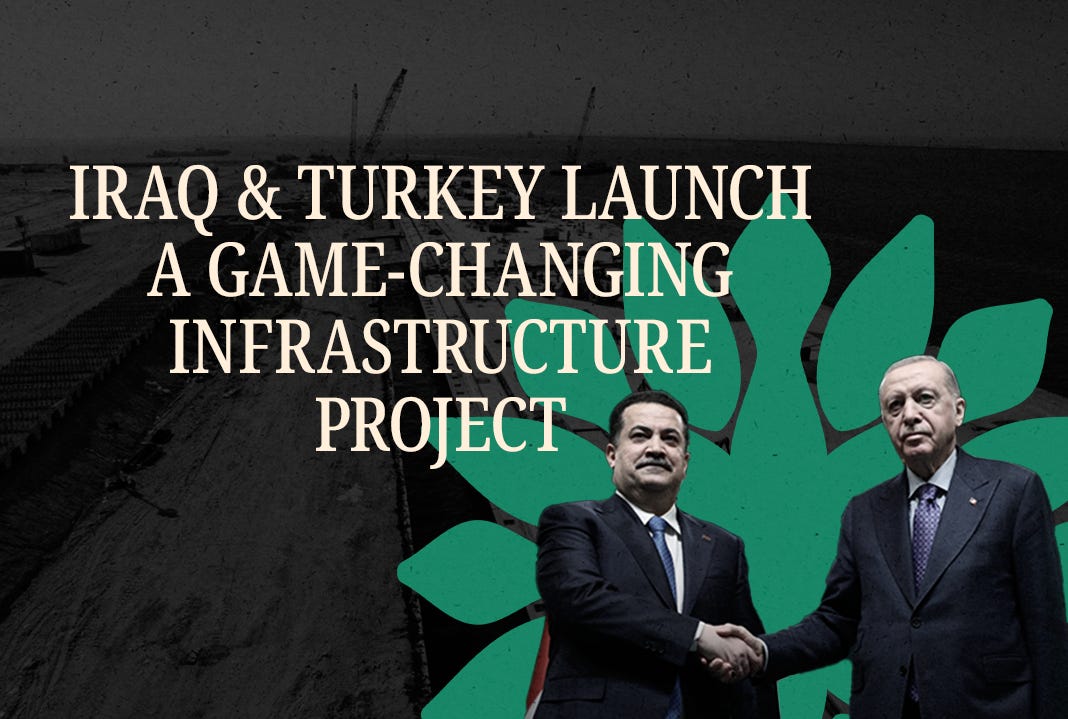Iraq and Turkey Launch a Game-Changing Infrastructure Project
A 1,200-kilometer corridor connecting Iraq to Europe could transform the region’s trade landscape—and Iraq’s future
As an Iraqi who has witnessed decades of war, missed opportunities, and chronic mismanagement, it's rare to encounter a project that inspires genuine optimism. But the Development Road—a project some are already calling Iraq's Suez Canal—represents a departure from the dysfunction of the past. Rather than fueling ideological divisions or foreign entanglements, the project focuses on practical goals like economic development and cross-border collaboration. Turkey’s steady, pragmatic engagement strengthens its potential.
The Development Road (also known as the "Dry Canal") is Iraq's most ambitious infrastructure plan in decades: a 1,200-kilometer multi-modal corridor that will link the Grand Faw Port in southern Iraq to the Turkish border and, by extension, to Europe. The project includes both highway and railway lines, cutting across ten provinces and offering a new overland alternative to maritime shipping through the Suez Canal.
With an estimated cost of $17 billion and phased execution through 2028, the Development Road could dramatically reduce transit time and costs for Gulf exports to Europe by as much as 10 to 15 days and up to 30%, respectively. While not intended to replace the Suez Canal, the corridor would provide a critical parallel route and elevate Iraq's standing in global logistics.
For a country hampered by youth unemployment and a deteriorating infrastructure, the Development Road could be groundbreaking. Early projections estimate the creation of over 100,000 direct and indirect jobs. Construction alone will require engineers, drivers, laborers, and port operators. Post-construction, the corridor will ostensibly create jobs in customs, transportation, logistics, warehousing, and maintenance.
Entire sectors stand to benefit: steel and cement factories will see rising demand, agriculture will find new market access, and towns along the route could experience a revival of commercial life. Similar corridors in Turkey, the UAE, and China have demonstrated how infrastructure can stimulate underdeveloped areas. With the proper oversight, this could become Iraq's most powerful job engine since the oil boom.
What sets this project apart is the nature of its foreign partnership. Unlike other regional powers that have historically treated Iraq as a proxy battlefield, Turkey's involvement is defined by mutual economic interest. Ankara brings not only investment but also deep expertise in infrastructure and logistics. This is a transactional relationship focused on growth, not ideology.
President Recep Tayyip Erdoğan has publicly stated that the Development Road will enhance regional stability, highlighting Iraq's role in a broader economic vision that includes the Gulf and Europe. Unlike other actors, Turkey is not seeking to impose sectarian agendas. Its engagement reflects a recognition that a stable, interconnected Iraq benefits everyone.
The Development Road stands to benefit the entire Gulf and European economies. Gulf countries currently rely on shipping routes through the Strait of Hormuz and the Suez Canal—both vulnerable chokepoints. Both have frequently been used as strategic levers in regional conflicts, either by threatening closure or manipulating access to exert political or economic pressure. An overland route through Iraq offers a faster, cheaper, and more stable alternative.
European nations, too, have taken note. The European Union has expressed interest in the corridor as part of its Global Gateway initiative, which aims to diversify trade routes and reduce dependence on maritime logistics, especially in times of geopolitical disruption.
While not a direct replacement, Iraq's Development Road is a strategic competitor to the Suez Canal. Egypt may view this with concern, but from Baghdad's perspective, it marks a long-overdue reassertion of Iraq's historical role as a trade nexus.
Historically, Iraq was a vital link between East and West. This project could help reclaim that legacy, while shifting Iraq’s global image from a zone of conflict to a hub of commerce and cooperation. That narrative change alone is worth its weight in geopolitical capital.
The road ahead is not without obstacles. Security remains a concern, particularly in regions where militias operate. Corruption and bureaucratic inefficiency could derail timelines. Political instability may jeopardize commitments or delay execution.
More importantly, the project’s success hinges on sustained cooperation with Turkey and Gulf partners. This is a regional initiative that demands transparency, continuity, and vision. Teamwork.
Iraq’s history of external interference, internal dysfunction, and stalled development has left little room for optimism. The Development Road offers a rare opportunity for economic recovery and for Iraq to assert its sovereignty, rebuild institutional capacity, and re-engage meaningfully with the region.
For the first time in a long while, Iraqis like me can begin to cautiously imagine a different future.
If Iraq can deliver on this promise, the Development Road will transform its economy and reposition it as a linchpin of regional integration. Iraq has long been at the receiving end of other nations’ ambitions. This project offers a chance to lead, to build, and to matter again.
Middle East Uncovered is powered by Ideas Beyond Borders. The views expressed in Middle East Uncovered are those of the authors and do not necessarily reflect the views of Ideas Beyond Borders.


